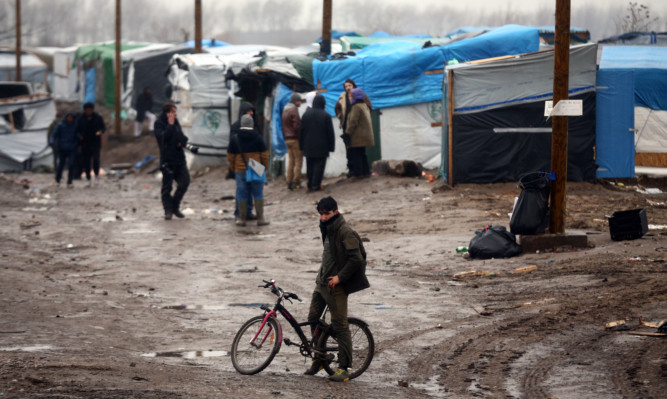A vote for Brexit could result in migrant camps being moved from Calais to the British side of the English Channel, a French government minister has suggested.
Finance minister Emmanuel Macron indicated that British withdrawal from the EU could lead to Paris ending a 2003 treaty which allows UK border guards to be stationed in Calais, where thousands of migrants live in makeshift encampments awaiting their opportunity to cross the Channel.
Speaking ahead of talks between David Cameron and President Francois Hollande in the French city of Amiens, Mr Macron also suggested France would “roll out the red carpet” for bankers wanting to “repatriate” from the City of London to Paris if Britain quit the EU.
He cautioned that any country leaving the 28-nation bloc could not expect to retain the same terms of trade with its former partners.
The Prime Minister is likely to see Mr Macron’s comments as confirmation of his own warning that France could stop allowing UK border checks on its side of the Channel if Britain votes to leave the EU.
Downing Street confirmed that the two men are expected to discuss the situation in Calais at the Anglo-French summit, where security is top of the agenda.
Mr Cameron said he was “convinced” EU membership enhances Britain’s security, as he prepared to unveil plans to co-operate with France on the development of a new advanced drone.
Mr Macron indicated that UK departure from the EU would scupper the Le Touquet treaty which has seen UK border officials carrying out checks on the French side of the Channel.
“The day this relationship unravels, migrants will no longer be in Calais,” he said.
Meanwhile, the “financial passport” system which allows UK financial services companies to operate in the rest of Europe would “work less well”, he said,
In an echo of Mr Cameron’s 2012 offer to “roll out the red carpet” to businessmen fleeing high-tax France, Mr Macron told the FT: “If I were to reason like those who roll out red carpets, I would say we might have some repatriations from the City of London.”
He also said a country leaving the single market would “not be able to secure the same terms” of access to the market, and the EU’s “collective energy would be spent on unwinding existing links not recreating new ones”.
Mr Cameron and Mr Hollande were expected to reaffirm their commitment to wage a “relentless” battle against the threat of international terrorism after last year’s attacks on Paris which left 130 dead and hundreds injured.
This will include intensifying police and security co-operation with enhanced information-sharing between security forces and making full use of the Interpol lost and stolen travel documents database and the Schengen information system.
Pro-Brexit ministers like Iain Duncan Smith have argued that Britain’s membership of the EU – and the commitment to free movement of people – leaves it exposed to the danger of a Paris-style attack.
However Mr Cameron will use the gathering to emphasise that being in the EU strengthens UK security while boosting its ability to project power around the globe.
“The UK and France are proud allies. Our meeting here in Amiens today is an opportunity to discuss how we can work even more closely together to keep our people safe,” he said in a statement ahead of the talks.
“I am convinced that the UK’s membership of the EU gives us greater security and greater capacity to project power globally. In an ever more uncertain world, we gain from our membership of these international organisations.”
The two leaders will also announce £1.5 billion of investment in a joint project to build a prototype of the next generation of military drone described as the most advanced vehicle of its kind in Europe.
It follows a £120 million feasibility study for the Future Combat Air System launched at the last UK-France summit two years ago.
The talks – which will be attended by Foreign Secretary Philip Hammond, Home Secretary Theresa May, Defence Secretary Michael Fallon and their French counterparts – will also cover the migration crisis and the conflicts in Syria and Libya.
The PM has also confirmed he wants to speak to Mr Hollande about the Hinkley Point C nuclear power plant, due to be built in partnership with French firm EDF Energy. There have been calls for the project to be delayed over fears of reactor design flaws.
